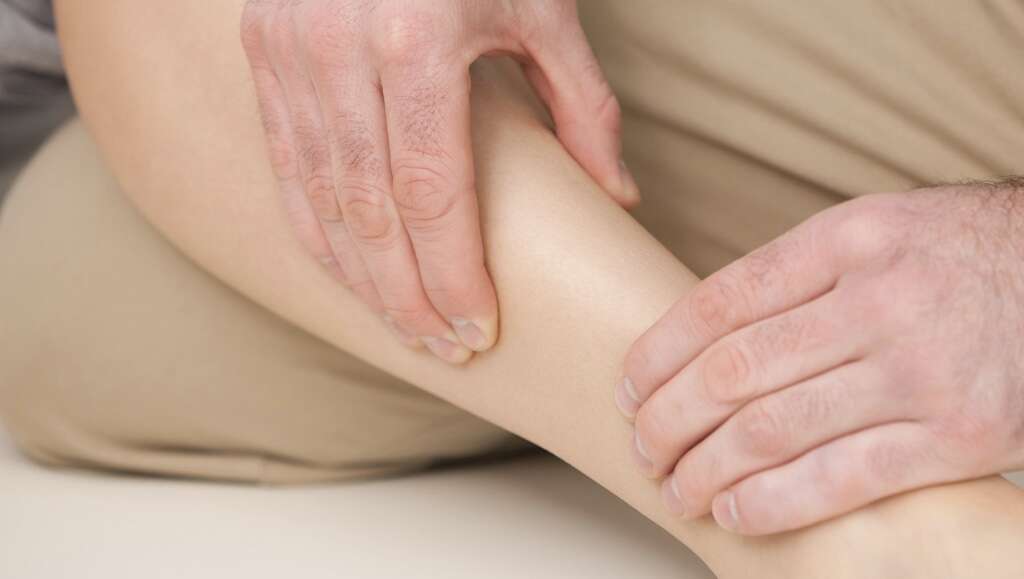10 Myofascial Pain Syndrome Symptoms
We all feel pain. It is an unavoidable and even a necessary part of life. It is a defense mechanism that helps to prevent us from hurting ourselves physically. Without it, there is a good chance that we would cause ourselves severe physical harm and not even react to it.
Myofascial pain syndrome, however, causes pain even when not necessary. Patients will have trigger points that can lead to a variety of symptoms when activated.
Myofascial pain can also cause pain in unrelated parts of the body and is even associated with some psychological symptoms. It can be very difficult to cope with depending on the severity of the condition.

Symptom #1: Referred Pain
If you hit your finger, then you will usually feel pain in that finger. This alerts us to the fact that something is wrong and helps prevent us from hurting ourselves more. In some cases, though, a problem in one part of the body might cause pain in another part of the body.
A common symptom of myofascial pain syndrome is referred pain. This refers to a phenomenon where pain is not always felt in the area of the body that is experiencing a problem, but it felt elsewhere instead. It is quite common in problems with certain organs that can cause pain to be felt in the back, away from the organ itself.

Symptom #2: Tender Knot
In some cases, there may be a specific area of a certain muscle that is feeling pain. Patients often describe this sensation as a “knot” that feels very tender to the touch. In many cases, it may not be felt at all, asides from when pressure is applied to the area.
If you are experiencing a pain like this then you should make sure to tell your doctor, and they could maybe refer you to a specialist. Not a great deal is known about myofascial pain syndrome but the experts might still be able to help in some way. At the very least, they may be able to reduce the intensity of the pain.

Symptom #3: Persistent Pain
Pains are usually only short-lived. They can last for hours, or even days, after an injury but they will usually begin to fade within a few days or so. If the pain does not go away, however, then it could be a sign that all is not right with you. It could be a sign that you are suffering from myofascial pain syndrome.
Not only is the pain associated with myofascial pain syndrome likely to persist, but it is also likely to get worse. This has the potential to cause a serious decrease in the quality of life for the patient. It is definitely something that you should contact a doctor about to try and find a solution.

Symptom #4: Deep Ache
Pain is never a pleasing sensation, but there are different types. People will often feel sharp, stabbing pains and these are often considered to be the worst. The severity of pain is also likely to be in accordance with the severity of the injury. Another common type of pain is a deep ache, and this is often felt by patients with myofascial pain syndrome.
This dull ache may not be as sharp as other types of pain but it can still be very uncomfortable to deal with. If it is too uncomfortable then try speaking with a doctor and they may be able to prescribe something to ease the discomfort.

Symptom #5: Hardening of the Muscle
Our muscles are usually quite soft when they are at rest. When tensed up, though, they can become quite hard. We are able to do this deliberately and it can also happen when we are working out. People that work their muscles hard are likely to have harder muscles than those that don’t.
Muscles should still be soft when at rest regardless of how fit you might be. Patients with myofascial pain syndrome, however, can find that stimulating triggers can cause the muscles to contract and harden. This can become very uncomfortable if the patient remains that way for too long.

Symptom #6: Behavioral Disturbances
Myofascial pain syndrome is something that is not at all well understood and needs a lot more research. While it tends to manifest itself as physical pain, it is also often closely associated with emotional conditions. As such, some patients that experience myofascial pain syndrome may also suffer from behavioral disturbances. This can include conditions such as aggression, agitation, anxiety, and even psychosis.
Behavioral disturbances are often easy to overlook as people don’t know what to look for. It can be easy to just think that the patient is an unsociable person. The reality could be that they have an illness and deserve help, and myofascial pain syndrome symptoms may be able to help recognize the problem.

Symptom #7: Fatigue
Anybody that has worked out will know how tiring it can be. Even people that are in good shape will eventually become tired and need a break and some food. Our muscles can only go on for so long without a proper rest. In myofascial pain syndrome, however, we can become fatigued faster than usual.
Myofascial pain syndrome can cause pains, spasms, and other symptoms that are a drain on the patient. This can cause them to become fatigued sooner than other people might do, no matter how healthy they might otherwise be. At times, it can be difficult for them to perform even simple tasks as they just don’t have the energy.

Symptom #8: Depression
There is still a lot of ignorance about depression, although we have made a lot of strides in regards to helping people understand in recent years. What was once thought to be a matter of people simply feeling unhappy is now understood to be a clinical problem. It is responsible for taking many lives of otherwise healthy people.
There is also a link between depression and myofascial pain syndrome, although it is not always clear which one causes the other. Regardless of the cause, depression should always be taken seriously and the patient should be found professional medical help where possible.

Symptom #9: Difficulty Sleeping
Many people that are lucky enough to get a full night’s sleep every night just don’t know how fortunate they are. We take for granted being able to wake up feeling fresh in the morning and ready for the day ahead. A lot of people, however, struggle to get much sleep at all and it can lead to a horrible time.
Sleeping problems are caused by a wide range of reasons, and pain is one of them. Many people with myofascial pain syndrome will go to bed at night in pain and it can keep them awake all night. Persistent lack of sleep can cause a significant drop in the quality of life.

Symptom #10: Weakness
The more powerful our muscles are then the stronger we are. Having said that, even people that are not particularly powerful can still feel strong. It is quite often a relative experience and even smaller people can still feel strong within themselves. That can change for people of any size with myofascial pain syndrome, however.
The condition can help to make even the fittest and strongest of people feel weak. The reality is likely to be that they are not weak at all but the condition is making them feel as though they are. If you do experience unexplained weakness then you should get it checked out no matter what the suspected cause.










